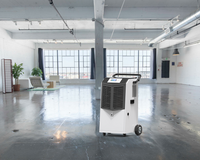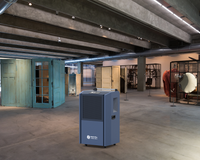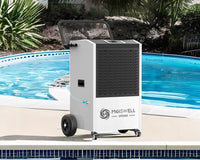Dehumidifiers are an essential tool for maintaining a comfortable and healthy indoor environment. Whether in homes, offices, or industrial spaces, these devices play a crucial role in controlling humidity levels and alleviating associated problems. In this comprehensive guide, we'll delve into the world of dehumidifiers, covering their functionality, benefits, types, and how to choose the right one for your needs.
Understanding Dehumidifiers
Dehumidifiers are appliances designed to reduce and maintain the level of humidity in the air. By pulling in moist air, cooling it to condense the moisture, and then reheating it, they effectively extract excess moisture and release dry air back into the room.
Benefits of Dehumidifiers
Mold and Mildew Prevention: By maintaining optimal humidity levels, dehumidifiers inhibit the growth of mold and mildew, protecting your health and the structural integrity of your space.
Allergy Relief: Dehumidifiers can help alleviate allergy symptoms by reducing dust mites, pet dander, and mold spores present in the air.
Odor Reduction: They aid in minimizing musty odors by keeping the air fresh and free from excessive dampness.
Preservation of Items: Dehumidifiers can protect valuable belongings like artwork, documents, and electronics from moisture-induced damage.
Types of Dehumidifiers
Refrigerative (Compressor) Dehumidifiers: The most common type, these dehumidifiers cool the air to condense moisture, then reheat it before releasing it back into the room.
Desiccant Dehumidifiers: These use a desiccant material to absorb moisture from the air, making them ideal for lower temperature environments.
Thermoelectric (Peltier) Dehumidifiers: Compact and quiet, these dehumidifiers use an electric current to create a temperature difference, condensing moisture from the air.
Ionic Membrane Dehumidifiers: These use an ionic membrane to remove moisture from the air without refrigeration, suitable for smaller spaces.
Choosing the Right Dehumidifier
Room Size: Consider the size of the space you need to dehumidify. Match the dehumidifier's capacity (usually measured in pints per day) to the room's square footage.
Humidity Levels: Determine the average humidity levels in your area to choose a dehumidifier that can effectively maintain the desired humidity level.
Drainage Options: Decide if you prefer manual emptying or continuous drainage through a hose, which is convenient for uninterrupted operation.
Energy Efficiency: Look for ENERGY STAR certified dehumidifiers that operate efficiently, saving you energy and costs.
Dehumidifiers are valuable appliances that help maintain a healthy and comfortable indoor environment. Understanding their benefits, types, and how to choose the right one for your needs is essential.
Everything You Need to Know About Dehumidifiers





